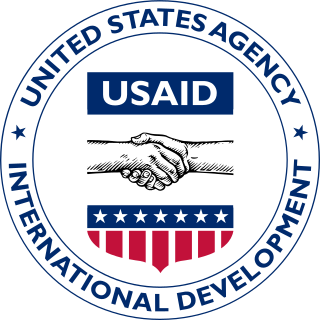
A cooperative is "an autonomous association of persons united voluntarily to meet their common economic, social and cultural needs and aspirations through a jointly owned and democratically-controlled enterprise". Cooperatives are democratically controlled by their members, with each member having one vote in electing the board of directors. Cooperatives may include:

The United States Agency for International Development (USAID) is an independent agency of the United States government that is primarily responsible for administering civilian foreign aid and development assistance. With a budget of over $27 billion, USAID is one of the largest official aid agencies in the world and accounts for more than half of all U.S. foreign assistance—the highest in the world in absolute dollar terms.

A housing cooperative, or housing co-op, is a legal entity, usually a cooperative or a corporation, which owns real estate, consisting of one or more residential buildings; it is one type of housing tenure. Typically housing cooperatives are owned by shareholders but in some cases they can be owned by a non-profit organization. They are a distinctive form of home ownership that have many characteristics that differ from other residential arrangements such as single family home ownership, condominiums and renting.

The NLnet Foundation supports organizations and people that contribute to an open information society. It was influential in spreading the Internet throughout Europe in the 1980s. In 1997, the foundation sold off its commercial networking operations to UUNET, resulting in an endowment with which it makes grants.
The North American Students of Cooperation (NASCO) is a federation of housing cooperatives in Canada and the United States, started in 1968. Traditionally, NASCO has been associated with student housing cooperatives, though non-student cooperatives are included in its network. NASCO provides its member cooperatives with operational assistance, encourages the development of new cooperatives, and serves as an advocate for cooperatives to government, universities, and communities. NASCO teaches leadership skills, provides information, and serves as a central link in facilitating the fruition of the cooperative vision for students and youth.
A worker cooperative is a cooperative owned and self-managed by its workers. This control may mean a firm where every worker-owner participates in decision-making in a democratic fashion, or it may refer to one in which management is elected by every worker-owner who each have one vote.
The Rural Business-Cooperative Service is one of three agencies within USDA Rural Development responsible for administering various economic development programs to rural communities in the United States and its territories. Because these three agencies are closely aligned, they are commonly referred to as the USDA Rural Development, Business & Cooperative Programs.

A grant is a fund given by a person or organization, often a public body, charitable foundation, a specialised grant-making institution, or in some cases a business with a corporate social responsibility mission, to an individual or another entity, usually, a non-profit organisation, sometimes a business or a local government body, for a specific purpose linked to public benefit. Unlike loans, grants are not intended to be paid back. Examples include student grants, research grants, the Sovereign Grant paid by the UK Treasury to the monarch, and some European Regional Development Fund payments in the European Union.
In different administrative and organizational forms, the Food for Peace program of the United States has provided food assistance around the world for more than 60 years. Approximately 3 billion people in 150 countries have benefited directly from U.S. food assistance. The Bureau for Humanitarian Assistance within the United States Agency for International Development (USAID) is the U.S. Government's largest provider of overseas food assistance. The food assistance programming is funded primarily through the Food for Peace Act. The Bureau for Humanitarian Assistance also receives International Disaster Assistance Funds through the Foreign Assistance Act (FAA) that can be used in emergency settings.
Tahrunessa Ahmed Abdullah is a Bangladeshi writer and activist. She is notable for her researches and contribution to an uplift in the lives of women in rural Bangladesh through her various levels of involvement with Bangladesh Academy for Rural Development. In 1978, she became the first Bangladeshi to receive the Ramon Magsaysay Award in the community leadership category.
The Robin Hood Foundation is a charitable organization which attempts to alleviate problems caused by poverty in New York City. The organization also administers a relief fund for disasters in the New York City area. In 2010, a key supporter gave every family with children on welfare in New York State $200 to buy school supplies. In 2017, Robin Hood appointed author and US Army veteran Wes Moore as its first CEO. In September 2021, Richard Buery, Jr. joined Robin Hood as the new Chief Executive Officer.

Scholarship America is a Minnesota-based American philanthropic organization that assists communities, corporations, foundations and individuals with fundraising, managing and awarding scholarships to students. The organization designs, administers and manages corporate and foundation scholarship programs; it also operates Dollars for Scholars, a coalition of local scholarship organizations in communities across the United States.

Freeing nearly 13,000 girls from indentured servitude has been a major accomplishment of the Nepal Youth Foundation (NYF), a U.S.-based 501(c)(3) non-profit organization. The mission of NYF is to provide children in Nepal with education, housing, medical and nutritional care, and general support.
The name California Fire Safe Council (CFSC) has been used for two very different organizations. The original use of the name, from 1993 through mid-2002, referred to a loose consortium of local community-based fire safe councils and other organizations that shared the mission of making California's communities less vulnerable to catastrophic wildfire. It was funded by the state of California Resources Agency, Department of Conservation, Division of Forestry, also called CDF or CAL FIRE. It was led by staff from the CDF Prevention Bureau.
Media development involves capacity building for institutions or individuals related to freedom of expression, pluralism and diversity of media, as well as transparency of media ownership. Media development plays a role in democracy and effective democratic discourse through supporting free and independent media.
CooperationWorks! is a network of organizations promoting rural development through the formation of cooperatives in the United States. CooperationWorks! is organized as a cooperative of 21 member development centers. The co-op facilitates the coordination of cooperative development efforts and provides business expertise to its member organizations.
The Clinton Bush Haiti Fund was a 501(c)(3) nonprofit organization founded on January 16, 2010, by former US Presidents Bill Clinton and George W. Bush, to aid the victims of the 2010 Haiti earthquake. The organization was formed in response to the request of President Barack Obama for the former Presidents to assist in the Haitian rescue effort. The fund concluded formal operations on December 31, 2012.

China Foundation for Poverty Alleviation (CFPA) is a nongovernmental charitable organization in Beijing, China, registered under the Chinese Ministry of Civil Affairs in 1989 and professionally supervised by the State Council Leading Group Office of Poverty Alleviation and Development.

The Local Initiatives Support Corporation (LISC) is a US non-profit community development financial institution (CDFI) that supports community development initiatives across the country. It has offices in nearly 40 cities and works across 2,100 rural counties in 44 states. LISC was created in 1979 by executives from the Ford Foundation. LISC's affiliates include the National Equity Fund (NEF), the largest national syndicator of Low Income Housing Tax Credits (LIHTC), the New Markets Support Company, a national syndicator of New Markets Tax Credits, and immito, which specializes in SBA 7a lending.

Philanthropies, formerly LDS Philanthropies, is a department of the Church of Jesus Christ of Latter-day Saints and is responsible for facilitating donations to humanitarian and educational initiatives. The department works under the direction of the church's Presiding Bishop. The most widely known educational projects are the operation of church-owned schools, such as Brigham Young University (BYU). Humanitarian funds are given to Latter-day Saint Charities which sponsors and organizes relief efforts. In 2019, the church reported over 3,000 community-based projects with an excess of 2,000 partners, in locations around the world. A 2020 statistic reported a total of $2.3 billion that had been donated over Philanthropies' existence.










